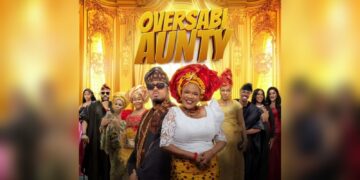Daniel Etim Effiong’s The Herd emerges as one of Nollywood’s most intense and socially resonant crime thrillers in recent years, offering an unflinching look at the terror, politics, and moral decay behind Nigeria’s banditry. Premiering on Netflix this weekend, the film intertwines personal tragedy with national trauma, creating a story that is both cinematic and starkly real.
Set in Ekiti, the film draws its tension from the contradictions of Nigerian society: communities terrorized by gangs exploiting ethnic identities, overburdened government institutions, and families forced into impossible moral choices. Effiong’s narrative does more than tell a story—it indicts a system steeped in corruption, complicity, and chaos.
The story begins on what should be a day of celebration. Gosi (Daniel Etim Effiong, also the director) tries to set aside his fears over his wife Adama’s recurring cancer scare to attend his friend Fola’s (Kunle Remi) wedding to Derin (Genoveva Umeh). But the joyful journey quickly descends into horror when a traffic jam caused by herders turns out to be the front for a ruthless kidnapping syndicate. Hostages are dragged into the bush, the groom is killed, and Derin is forced to carry out a grotesque order as part of a human body-parts trade.
Umeh delivers a haunting performance, capturing disbelief and grief with harrowing authenticity. Effiong’s Gosi, whispering promises to protect lives at any cost, anchors the film’s moral tension.
Unlike typical depictions, The Herd does not romanticize banditry. The criminals, drawn from Hausa, Yoruba, and Igbo backgrounds, are part of a criminal economy rather than an ethnic or religious crusade. Religion is exploited opportunistically, and the gang’s brutal actions starkly contrast with moments of ritual observance, reflecting the greed and impunity at the heart of their operations.
Adama’s desperate quest to raise ransom money underscores societal inequalities. She contends with an unhelpful bank, judgmental in-laws, and the revelation of her husband’s secret finances—painting a picture of a society where class, culture, and prejudice dictate access to aid. The subplot exploring her Osu status in Igbo culture adds emotional depth, highlighting the lingering influence of caste systems even amid life-threatening crises.
Law enforcement is depicted with nuance. Adam Garba’s police investigation cleverly integrates modern technology, including an Apple Watch call that links the criminals to their victims. The film exposes institutional complicity, from a church official to a respected priest (Lateef Adedimeji), illustrating how evil often hides behind moral authority.
Even seemingly benign characters, like Mama Rainbow, reveal the precariousness of trust. Internal gang rivalries further amplify tension, culminating in the murder of their godfather, Sheik, which underscores the film’s message: banditry is driven by greed, not ideology.
Costume and casting reinforce the story’s impact. Detailed visual cues—from bloodied bridal gowns to torn shirts—capture the descent from celebration to survival. Actors from Nigeria’s major ethnic groups populate both victims and villains, symbolizing national unity amid shared tragedy. Performances across the cast are strong, with standout roles from Umeh, Effiong, Blessing Jessica Obasi-Nze, and Amal Umar.
The film’s final act leaves some narrative threads unresolved, particularly regarding the remaining hostages. While this abruptness may frustrate viewers, it can also be read as a reflection of Nigeria’s real-life crises, which often end without closure.
The Herd is a bold and necessary film. It forces audiences to confront the harsh realities of banditry beyond politics, ethnic scapegoating, or sensational headlines. Through suspense, realism, and moral complexity, Effiong delivers one of Nollywood’s most compelling contemporary crime thrillers.










